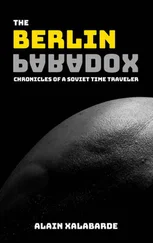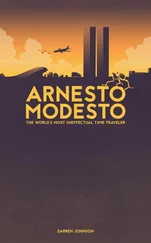James Gleick - Time Travel
Здесь есть возможность читать онлайн «James Gleick - Time Travel» — ознакомительный отрывок электронной книги совершенно бесплатно, а после прочтения отрывка купить полную версию. В некоторых случаях можно слушать аудио, скачать через торрент в формате fb2 и присутствует краткое содержание. Год выпуска: 2016, Издательство: Knopf Doubleday Publishing Group, Жанр: Старинная литература, на английском языке. Описание произведения, (предисловие) а так же отзывы посетителей доступны на портале библиотеки ЛибКат.
- Название:Time Travel
- Автор:
- Издательство:Knopf Doubleday Publishing Group
- Жанр:
- Год:2016
- ISBN:нет данных
- Рейтинг книги:5 / 5. Голосов: 1
-
Избранное:Добавить в избранное
- Отзывы:
-
Ваша оценка:
- 100
- 1
- 2
- 3
- 4
- 5
Time Travel: краткое содержание, описание и аннотация
Предлагаем к чтению аннотацию, описание, краткое содержание или предисловие (зависит от того, что написал сам автор книги «Time Travel»). Если вы не нашли необходимую информацию о книге — напишите в комментариях, мы постараемся отыскать её.
Time Travel — читать онлайн ознакомительный отрывок
Ниже представлен текст книги, разбитый по страницам. Система сохранения места последней прочитанной страницы, позволяет с удобством читать онлайн бесплатно книгу «Time Travel», без необходимости каждый раз заново искать на чём Вы остановились. Поставьте закладку, и сможете в любой момент перейти на страницу, на которой закончили чтение.
Интервал:
Закладка:
Negligently he opens his eye: he sees an indefinite number of stars, a nebulous line of trees. Then he sinks into a sleep without memories, as into dark waters.
Borges notes that this is “a literary, not a historical” case. The doubting reader is invited to substitute a personal memory. Think of an incident in your past. When is that memory? Not at any time—not at any precise time. It is an instant on its own, suspended, apart from any supposed space-time continuum. Spacetime? “I tend to be always thinking of time, not of space,” Borges writes. “When I hear the words ‘time’ and ‘space’ used together, I feel as Nietzsche felt when he heard people talking about Goethe and Schiller—a kind of blasphemy.”
He denies simultaneity, just as Einstein did, only Borges does not care about the signal velocity (light speed) because our natural state is alone and autonomous, our signals are fewer and less reliable than the physicist’s.
The lover who thinks, “While I was so happy, thinking about the faithfulness of my beloved, she was busy deceiving me,” is deceiving himself. If every state in which we live is absolute, that happiness was not concurrent with that betrayal.
The lover’s knowledge cannot modify the past, though it can modify the recollection. Having dispensed with simultaneity, Borges also denies succession. The continuity of time—the whole of time—another illusion. Furthermore, this illusion, or this problem, the never-ending effort to assemble a whole from a succession of instants, is also the problem of identity. Are you the same person you used to be? How would you know? Events stand alone; the totality of all events is an idealization as false as the sum of all the horses: “The universe, the sum total of all events, is no less ideal than the sum of all the horses—one, many, none?—Shakespeare dreamed between 1592 and 1594.” Oh, Marquis de Laplace.
We have a tendency to take our words too seriously, which happens (paradoxically) when we are unconscious of them. Language offers a woefully meager set of choices for expressing what we need to express. Consider this sentence: “I haven’t seen you for a [?] time.” Must the missing word be long ? *7Then time is like a line or a distance—a measurable space. The language forces this upon us. Who was the first person to say that time “passes” or time “flows”? We are seldom conscious of the effect of language on our choice of metaphors, the effect of our metaphors on our sense of reality. Usually we give the words no thought at all. When we do, we may well wonder what we’re really saying. “I’m terrified of the thought of time passing (or whatever is meant by that phrase) whether I ‘do’ anything or not,” Philip Larkin wrote to his lover Monica Jones. The words lead us in a certain direction.
In English and most Western languages, the future lies ahead. In front of us. Forward. The past is behind us, and when we are running late we say we have fallen behind. Yet this forward-backward orientation is neither obvious nor universal. Even in English, it seems we can’t agree on what it means to move a meeting back one day. Some people are certain that back means earlier. Others are equally certain that it means later. On Tuesday, Wednesday lies before us, though Tuesday is before Wednesday. Other cultures have different geometries. Aymara speakers, in the Andes, point forward (where they can see) when talking about the past and gesture behind their backs when talking about the future. In other languages, too, yesterday is the day ahead and tomorrow is the day behind. The cognitive scientist Lera Boroditsky, a student of spatiotemporal metaphors and conceptual schemas, notes that some Australian aboriginal communities orient themselves by cardinal direction (north, south, east, west) rather than relative direction (left, right) and think of time as running east to west. (They have a strongly developed sense of direction, compared to more urban and indoor cultures.) Mandarin speakers often use vertical metaphors for time: 上 ( shàng ) means both above and earlier; 下 ( xià ) means below and next. The up month is the one that just ended. The down month is on its way.
Or are we on our way? Boroditsky and others speak in terms of “ego-moving” versus “time-moving” metaphors. One person may feel the deadline approaching. Another may feel herself approaching the deadline. These may be the same person. You may swim onward, or the river may bear you.
If time is a river, are we standing on the bank or bobbing along? “To say time passes more quickly, or that time flows, is to imagine something flowing,” wrote Wittgenstein.
We then extend the simile and talk about the direction of time. When people talk of the direction of time, precisely the analogy of a river is before them. Of course a river can change its direction of flow, but one has a feeling of giddiness when one talks of time being reversed.
That is the giddiness of the time traveler—like looking at an Escher staircase. Time passes. “The hours pass slowly.” “The hours pass quickly.” And without contradicting ourselves, we pass the time. We say these words, and we understand them perfectly.
Time is not a river. Where does that leave time travel?
—
A MAN LIES supine on an iron cot in a locked room, pondering his own imminent death. Through the window he can see roofs and the sun, shaded by clouds. He is aware of the time: it is a “six o’clock sun.” His name may or may not be Yu Tsun. We gather that he is a German spy. He is in possession of the Secret. The Secret is a single word, a name, “the exact location of the British artillery park on the River Ancre.” But he has been discovered and marked for assassination. He turns out to be something of a philosopher.
It seemed incredible to me that that day without premonitions or symbols should be the one of my inexorable death….Then I reflected that everything happens to a man precisely, precisely now. Centuries of centuries and only in the present do things happen; countless men in the air, on the face of the earth and the sea, and all that really is happening is happening to me.
This is a fiction by Borges, “ El jardín de senderos que se bifurcan, ” the title story of his first collection—eight stories, sixty pages—published in 1941 by the modernist journal Sur in Buenos Aires. Borges, who read The Time Machine with excitement when he was young, had published some poetry and some criticism. He was a prolific translator from English, French, and German, including Poe, Kafka, Whitman, and Woolf. To support himself he worked as an assistant at a small, down-at-the-heels branch library, cataloguing and cleaning the books.
Seven years later, “The Garden of Forking Paths” became Borges’s first story to appear in English translation. His American publisher was not a literary establishment or journal but Ellery Queen’s Mystery Magazine, August 1948. He did appreciate mystery. Now his reputation is large, but he did not gain much fame in English-speaking countries until the sixties, when he shared the first Prix International with Samuel Beckett. By then he was an old man, and blind.
Ellery Queen (joint pseudonym for two cousins from Brooklyn) was happy to publish what could barely be called a detective story. It has no detective, but it does have a struggle among spies, a pursuit, a revolver chambering a single bullet, a confrontation, and a murder. There is not just a mystery but a philosophical mystery—so we are told. Yu Tsun is informed, “Philosophic controversy usurps a good part of the novel.” To what does the controversy pertain?
I know that of all problems, none disturbed him so much as the abysmal problem of time. Now then, the latter is the only problem that does not figure in the pages of the Garden…
Читать дальшеИнтервал:
Закладка:
Похожие книги на «Time Travel»
Представляем Вашему вниманию похожие книги на «Time Travel» списком для выбора. Мы отобрали схожую по названию и смыслу литературу в надежде предоставить читателям больше вариантов отыскать новые, интересные, ещё непрочитанные произведения.
Обсуждение, отзывы о книге «Time Travel» и просто собственные мнения читателей. Оставьте ваши комментарии, напишите, что Вы думаете о произведении, его смысле или главных героях. Укажите что конкретно понравилось, а что нет, и почему Вы так считаете.












